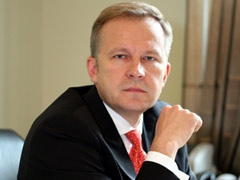Analytics, Energy, Inflation, Latvia
International Internet Magazine. Baltic States news & analytics
Saturday, 27.12.2025, 03:04
President of Bank of Latvia: high oil prices will delay decrease in inflation in Latvia
 Print version
Print version |
|---|
| Ilmars Rimsevics. |
Rimsevics said, asked if he still believes that inflation will go down by the end of summer: "There can always be international events or processes that may have an impact on, and unbalance, us. No one could foresee such a steep increase in oil prices, plus the surge in food prices. Therefore it is hard to make prognoses. But it would be really unfortunate if the gradual slowdown of economy would be accompanied by such factors. That would mean that the inflation will not decrease as fast as we thought it would."
Rimsevics admits that in case the oil prices continue to grow, as some experts said, "Then it is possible that the decrease in inflation could start approximately one month later."
"However, there is no doubt that the inflation will start to go down this year. So far our prognosis was that it would happen in the middle or end of summer. (...) We must pragmatically continue to implement the processes started and prevent an economic slump," Rimsevics added.
The Latvian government must do what it has promised to do, and achieve a surplus in the national budget, said Rimsevic.
Commenting why international experts often rate the Estonian economy more favorably than the Latvian, Rimsevics said it was a certain paradox, which "apparently may be explained by the assumption that Estonians are more pragmatic and their planning is much more precise: the Estonians will pull through, whereas the impression of Latvia is that we are have gone into a kind of free fall".
"In my opinion, rating agencies have made mistakes on more than one occasion, and they admit their mistakes: in trying to painstakingly forecast many matters, their experts have missed practically all the global crises. Perhaps this time they are trying not to fail again, and are programming some issues in a worse light than they should," Rimsevics said.
"One thing that the Estonians have done right: they have cut the budget spending, and that indeed meets foreign experts' expectations for decreased spending. Estonians made the decision, it cost them EUR 200 million. Therefore they are no longer in the limelight. The same is being expected from Latvia, that the budget approved by Saeima will have a surplus in it. That is why it is very important for us to justify the hopes placed in us. I could agree that it is not that important that the surplus meets the projection completely, but it has to be very close to the figure we promised to achieve," Rimsevics stressed.
Attaining these goals requires cutting government spending – or an improvement in tax collection, Rimsevics points out.
Rimsevics believes that the government is intent on achieving surplus in the budget by the end of the year: "After the meetings with the prime minister last month, I believe it is safe to say that the government is resolute and that a surplus will be achieved in the budget," Rimsevics added.








 «The Baltic Course» Is Sold and Stays in Business!
«The Baltic Course» Is Sold and Stays in Business!

